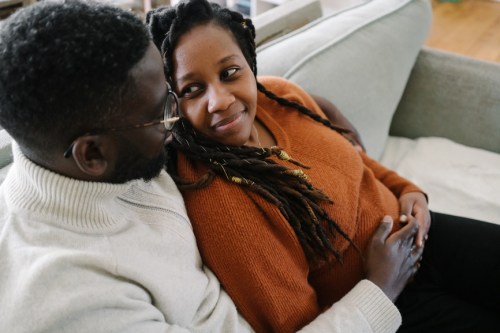In the most recent Glowing Live, activist and doula Latham Thomas spoke with Angela Doyinsola Aina, MPH, the co-founder and executive director of the Black Mamas Matter Alliance (BMMA), about the ways that the organization is working to fight Black maternal mortality. According to the Centers for Disease Control and Prevention (CDC), Black women are two to three times more likely to die from pregnancy and childbirth complications than white women—a statistic that has only risen during the pandemic.
Experts in This Article
co-director and research lead for the Black Mamas Matter Alliance
wellness expert, doula, and founder of Mama Glow
“We developed this network and decided that it needed to be formalized in 2016,” says Aina. “It was designed or organized to center research and advocacy work for, about, and by Black women and people in the reproductive justice community. This was the best way to fully understand what communities needed in their reproductive journeys to feel supported, safe, and heard.”
During their talk, Aina broke down four areas of advocacy and organizing that BMMA employs to support Black birthing people and reduce maternal mortality statistics.
Four ways BMMA is Working to Shift Black Maternal Health Outcomes
1. Supporting policy change
“In order to address the Black maternal mortality crisis, we need local level policy change to address how reproductive care is accessed,” says Aina. Policy changes at the federal, state and local levels are super important for the communities affected by maternal mortality.
For example, the BMMA supports an initiative to support and expand networks of Black midwives in Georgia. A 2022 briefing cited that, in Georgia, Black, non-Hispanic women were 2.3 times more likely to die from pregnancy-related causes than white, non-Hispanic women. There’s a centuries-long practice of Black midwifery promoting safe, healthy birthing practices. To that end, the BMMA is currently calling on the Georgia legislators to pass The Georgia Community Midwife Act in order to expand midwifery licensure and support Black midwifery in the state.
“The BMMA advocates for policy change because we need funds to pour into necessary resources that are needed for community-based resources and organizations that can offer services like doula care, child care, midwifery, education, support, accompaniment, and more,” says Aina, adding that the best change happens at the local level.
2. Cultivating research
Another integral part of the BMMA’s work is promoting and advocating for research. “We try to hone in on reproductive justice and Black feminism in the research,” says Aina. “This is because we know that there is a huge gap between social services and public health research and what Black women even want and need in their reproductive care or birth journeys.”
By using Black feminism as a lens, Aina shares that the organization can push the research to explore the needs and experiences of Black doulas and birth workers, and the experiences of people in rural communities.
The BMMA accomplishes this by supporting Black women and nonbinary professionals’ who are doing existing research, Aina says. Additionally, Aina explains that the BMMA also spends a lot of time advocating for data collection to have evidence that the government needs to allocate resources for these communities. All of this insight is frequently and repeatedly left out of the research, she explains.
3. Amplifying holistic maternity care
“Our biggest body of work is the amplification of holistic maternity care,” says Aina. Because the hospital systems and medical settings can be unsupportive, and dangerous spaces for Black people during their reproductive journeys—Aina explains that broadening the definition of perinatal care is really important.
This looks like expanding the knowledge of what community birth care can look like beyond a hospital or doctor’s office. It can include doulas, midwives, therapists, counselors, and community education centers that offer prenatal parenting classes, she explains. It also includes lactation consultants, postpartum doulas, abortion access, and educators who can teach people how to get insurance coverage for these services.
4. Shifting cultural understanding
“It’s important for us to amplify Black women leaders educating community members about this so we can shift the cultural understanding of what birth care can look like, which can then help Black moms have healthy, joyful, safe pregnancies and reproductive journeys,” says Aina.
“We want those broader and bigger systems and structures to listen to us and what we need,” says Aina. “We do this by making sure that we see ourselves reflected in the work at every level of the research, advocacy, community work, health care, and education.”
Oh hi! You look like someone who loves free workouts, discounts for cutting-edge wellness brands, and exclusive Well+Good content. Sign up for Well+, our online community of wellness insiders, and unlock your rewards instantly.
Sign Up for Our Daily Newsletter
Get all the latest in wellness, trends, food, fitness, beauty, and more delivered right to your inbox.
Got it, you've been added to our email list.











